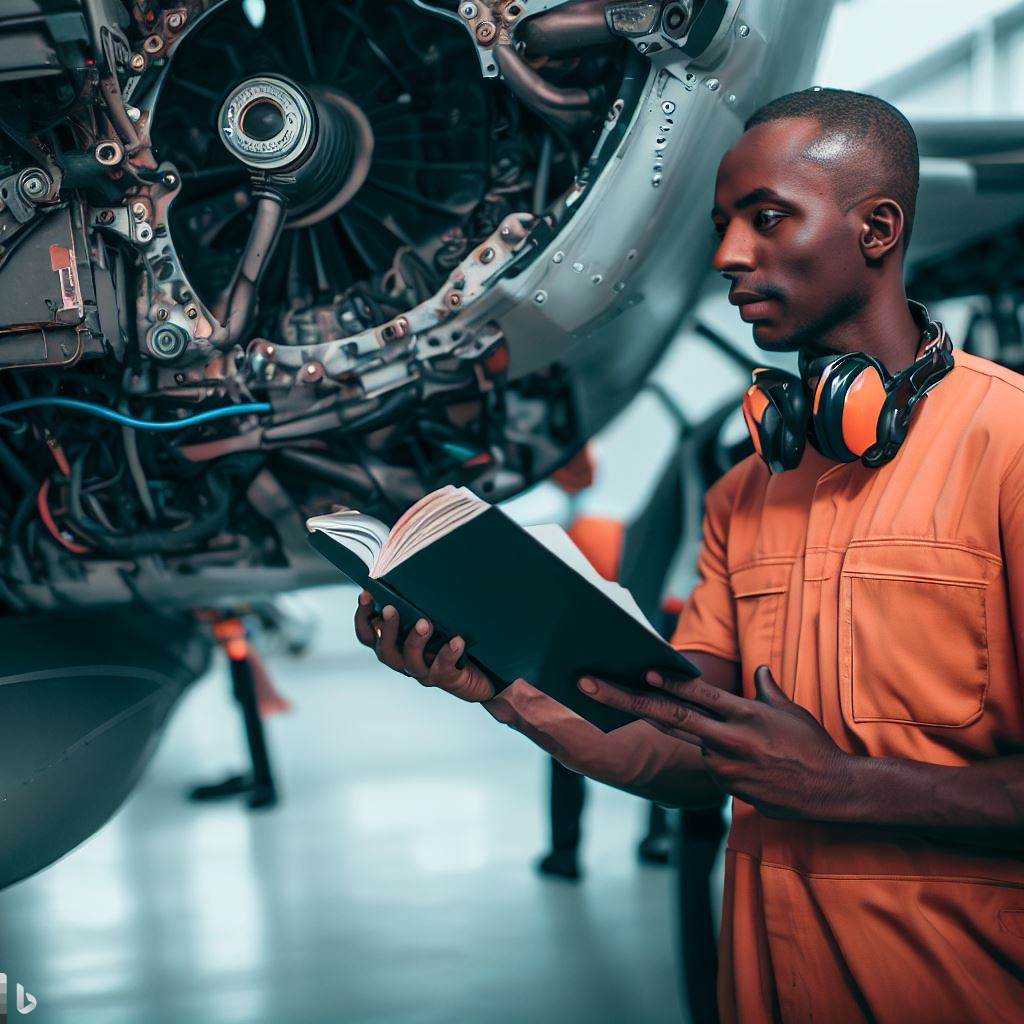Introduction
Aviation maintenance careers involve inspecting, repairing, and maintaining aircraft to ensure optimal safety and performance.
These careers are vital in ensuring that flights operate efficiently and safely. In Nigeria, aviation maintenance careers are essential as the aviation industry continues to grow.
The demand for skilled professionals in this field is crucial to ensuring that airplanes remain in good condition and that passengers arrive at their destinations safely.
Without skilled maintenance personnel, planes are at risk of malfunctions, which can lead to tragic accidents. Aviation maintenance careers also contribute to Nigeria’s economy as it creates job opportunities, which help in reducing unemployment rates and fostering economic growth.
It is imperative to understand that aviation maintenance is a critical factor and the backbone of the aviation industry.
These professionals have access to specialized training and knowledge that enables them to detect, diagnose, and repair any faults, which helps in keeping aircraft safe and in top condition.
In essence, aviation maintenance careers are essential for the aviation industry’s growth in Nigeria. The significance of these careers cannot be overstated, and it is crucial to attract and retain skilled professionals to help maintain safety and improve upon the sector’s growth.
Read: Addressing Challenges in Nigeria’s Aviation Profession
Overview of the Study
In a bid to provide insight into Aviation Maintenance Careers in Nigeria, a research study was conducted to gather information on the subject matter.
Carried out by
- The study was conducted by a team of aviation professionals and career experts in Nigeria.
- The team consisted of pilots, engineers, aviation maintenance technicians, and human resource professionals.
Purpose of the Study
- The study aimed to provide a comprehensive understanding of Aviation Maintenance careers in Nigeria.
- The purpose was to identify the challenges and opportunities available to individuals interested in pursuing a career in the field.
- The study also sought to provide guidance to prospective entrants, young professionals, and stakeholders interested in the aviation industry.
The methodology used in the Study
- The research team adopted a triangulation method to gather information on Aviation Maintenance Careers.
- Primary data was collected through direct interviews and surveys of industry professionals and career experts in Nigeria.
- The team also reviewed published academic articles, books, and online resources to collate secondary data.
- Both qualitative and quantitative data analysis techniques were utilized to establish trends and themes emerging from the data collected.
The study shows Nigeria’s aviation maintenance profession as dynamic and growing, offering opportunities but facing challenges like high training costs. Stakeholders, agencies, and organizations must intervene to unlock the industry’s full potential.
Read: Breaking into Nigeria’s Aviation Industry: Insider Tips
Objectives of Aviation Maintenance Careers in Nigeria
Aviation maintenance careers in Nigeria are an essential component of the aviation industry. The primary objective of these careers is to ensure the safety, reliability, and efficiency of aircraft operations.
This blog chapter focuses on the objectives of aviation maintenance careers in Nigeria and their relevance to the industry.
#1. Ensure the Safety of Aircraft Operations
The first objective of aviation maintenance careers in Nigeria is to ensure the safety of aircraft operations. This objective involves conducting regular maintenance and inspections of aircraft to identify and address any potential safety issues.
Trainers equip aviation maintenance technicians to perform detailed tasks with specialized tools, ensuring aircraft components function safely in Nigeria.
#2. Maintain the Reliability of Aircraft Operations
The second objective of aviation maintenance careers in Nigeria is to maintain the reliability of aircraft operations. This objective involves conducting preventative maintenance activities to avoid any unexpected downtime of aircraft.
Preventative maintenance can range from regular inspections of aircraft components to replacing parts according to the manufacturer’s recommended schedule.
This objective is essential to the aviation industry in Nigeria because it ensures that airlines can maintain their schedules and provide reliable air transport services to passengers and cargo.
#3. Ensure the Efficiency of Aircraft Operations
The third objective of aviation maintenance careers in Nigeria is to ensure the efficiency of aircraft operations. This objective involves maintaining the aircraft in the most efficient manner possible to reduce fuel consumption and operating costs.
Trainers equip aviation maintenance technicians to optimize fuel efficiency, reduce wear, and cut costs in Nigeria’s aviation industry.
#4. Enhance the Lifespan of Aircraft
The fourth objective of aviation maintenance careers in Nigeria is to enhance the lifespan of aircraft. Aviation maintenance technicians ensure aircraft longevity by applying the latest techniques, reducing premature replacements, and boosting airline investments in Nigeria.
#5. Keep up with Regulatory Requirements
The fifth and final objective of aviation maintenance careers in Nigeria is to keep up with regulatory requirements. Aviation maintenance technicians must comply with regulatory requirements, following maintenance standards and safety regulations in Nigeria.
Aviation maintenance technicians are trained to keep up to date with the latest regulatory requirements to ensure compliance.
In Nigeria’s aviation industry, this objective plays a critical role in enhancing overall aircraft operations’ safety and security.
In general, aviation maintenance careers in Nigeria have several objectives that are essential to the aviation industry.
Aviation maintenance technicians ensure safe, reliable, and efficient aircraft operations, enhance lifespan, and comply with regulations, supporting Nigeria’s aviation industry.
Read: Balancing Work-Life in the Aviation Industry of Nigeria
Challenges Faced in Aviation Maintenance Careers in Nigeria
Aviation maintenance careers are essential to the safety and success of the aviation industry. In Nigeria, these professionals face a range of challenges that affect their ability to perform their job effectively.
Transform Your Career in Nigeria
Discover unmatched expertise with our personalized Career Consulting service. Navigate Nigeria’s job market with a strategy tailored just for you.
Get StartedThis article will pinpoint challenges faced by aviation maintenance professionals in Nigeria and highlight their impact on the industry.
Challenges Faced by Aviation Maintenance Professionals in Nigeria
- Lack of Adequate Training: Aviation maintenance professionals in Nigeria face a major challenge: inadequate training due to limited schools, facilities, and trainers.
- Obsolete Equipment: Another challenge faced by aviation maintenance professionals in Nigeria is the use of outdated equipment. Most of the equipment used in the industry is outdated and in need of urgent replacement. This makes it difficult for these professionals to carry out their job effectively and efficiently.
- Lack of Government Support: The Nigerian government has not invested enough resources in the aviation industry to support its growth. Aviation maintenance professionals face a lack of support, affecting resource availability for effective job performance (funding and infrastructure).
- Poor Remuneration: Aviation maintenance professionals in Nigeria are not adequately compensated for their work. This leads to a lack of motivation and a decrease in the quality of their work. The poor remuneration also affects the retention of skilled professionals in the industry.
- Safety Concerns: The safety of aviation maintenance professionals is not a top priority in Nigeria. Most of the equipment used in the industry is outdated and poses a risk to the safety of the professionals who use them. This, coupled with the lack of safety regulations, exposes these professionals to unnecessary risks.
Impact of Challenges on the Aviation Industry in Nigeria
The challenges faced by aviation maintenance professionals in Nigeria have a significant impact on the aviation industry. Some of these impacts include:
- Reduced Safety Standards: Result from inadequate training, outdated equipment, and safety concerns in Nigeria’s aviation industry, risking lives.
- Decreased Efficiency: Aviation maintenance professionals’ efficiency decreases due to outdated equipment and resource constraints, causing delays and higher costs.
- Low Skilled Workforce: The aviation maintenance industry faces a low-skilled workforce, stemming from inadequate training and low remuneration, hindering growth.
- Reduced Investment: The lack of government support and poor remuneration reduce the attractiveness of the aviation maintenance industry in Nigeria. This reduces the level of investment in the industry, which affects its growth and development.
Essentially, the challenges faced by aviation maintenance professionals in Nigeria have a significant impact on the safety and efficiency of the aviation industry.
To improve the industry, there is a need for increased investment in training, equipment, and safety regulations.
The government must also prioritize the industry and provide adequate support to ensure its growth and development.
Read: Steps to Becoming a Pilot in Nigeria: A Comprehensive Guide

See Related Content: Professional Growth Paths in Nigeria’s Aviation Sector
See Related Content: Breaking into Nigeria’s Aviation Industry: Insider Tips
Opportunities in aviation maintenance careers in Nigeria
Aviation maintenance careers in Nigeria present a wide range of opportunities for individuals interested in the aviation industry.
Advancements in technology emphasize aviation maintenance’s importance, demanding skilled personnel for safe aircraft operations in Nigeria. Let’s explore career opportunities and their positive impact on the aviation industry.
Opportunities in Aviation Maintenance Careers
- Aircraft Maintenance Engineer
- Aircraft Mechanic
- Aircraft Inspector
- Aircraft Electrician
- Aircraft Avionics Technician
These careers require the expertise of skilled individuals to perform maintenance, repair, and inspection tasks on aircraft engines, airframes, and systems.
Aircraft maintenance engineers are responsible for designing and implementing maintenance programs, while aircraft mechanics perform routine maintenance and repair services.
Aircraft inspectors check for compliance with regulations and standards, while aircraft electricians and avionics technicians are responsible for maintaining electrical and avionic systems.
The Positive Impact of Aviation Maintenance Careers on the Industry
Nigeria’s aviation industry experiences rapid expansion, attracting more airlines and higher air travel demand. Skilled aviation maintenance personnel are vital for safety and efficiency.
Here are some ways in which aviation maintenance careers can positively impact the aviation industry:
- Increased Safety: The more qualified personnel are available to maintain and repair aircraft, the more likely the safety of passengers and crew can be ensured. Proper maintenance can prevent accidents and incidents caused by mechanical failure.
- Better Efficiency: Skilled personnel can make sure that aircraft are performing efficiently. Having aircraft maintenance careers in Nigeria guarantees that servicing can be done routinely, and issues can be quickly identified and resolved, minimizing downtime.
- Cost-Effective: Having skilled Nigerians in aircraft maintenance careers will drive down the costs involved in outsourcing such roles to other countries like Asia and Europe. This reduces the cost of operation for airlines.
- Job Creation: Aviation maintenance careers create opportunities for Nigerians to engage in meaningful and rewarding work, which in turn benefits the country’s economy. These jobs can improve the standard of living for individuals and families by providing steady employment.
- Improved Technical Capabilities: Developing the aviation maintenance sector in Nigeria will, in turn, boost technical skills and the development of new technologies for aviation operations.
Aviation maintenance careers in Nigeria
Provide numerous opportunities for Nigerians interested in the aviation industry and have a significant impact on the aviation industry as a whole, leading to better efficiencies, increased safety, lower costs, technological advancements, and job creation.
Therefore, the government and private sector organizations should invest in programs and policies that promote the training and development of skilled personnel in aviation maintenance careers.
Your Unique Story, Perfectly Told
Don't let your dream job slip away with a generic resume. We craft personalized resumes and cover letters that highlight your unique strengths, making you unforgettable to Nigerian employers.
Get HiredThis investment will not only elevate Nigeria’s aviation sector but also enhance the country’s economic growth and development.
Read: The Impact of COVID-19 on Aviation Jobs in Nigeria
Conclusion
After discussing the various aspects of aviation maintenance careers in Nigeria, we can conclude that it is a highly rewarding field with immense potential for growth.
From the job opportunities available to the skills required, there are many reasons why individuals should pursue a career in aviation maintenance in Nigeria.
One of the most important points to note is the increasing demand for skilled professionals in the aviation industry in Nigeria.
As the industry expands and modernizes, qualified individuals are needed to keep both aircraft and infrastructure working efficiently.
Furthermore, the career offers opportunities for personal and professional advancement, with numerous training programs and certifications available.
These can help individuals to upskill and increase their earning potential over time.
Overall, aviation maintenance careers in Nigeria are an essential part of the nation’s aviation industry. By pursuing a career in this field, individuals can play a vital role in the safety and efficiency of air travel.




